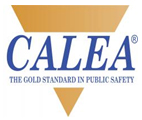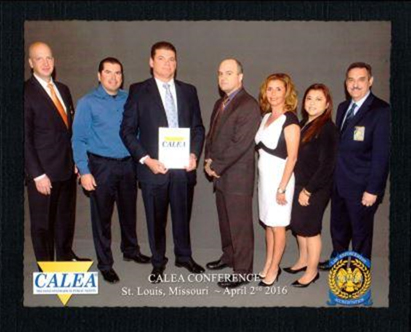
Emergencies:
911
Non Emergencies:
Sheriff's Office
915-546-2280
e-mail us
Text Crime Tips Anonymously!
Use Tip 411

Comments or Concerns?

El Paso Police
915-832-4400



Annual Reports
2016
2015
2014
2013
2012
2011
2010
2009
2008
Other Resources
Texas Attorney General
Consumer Information
Upcoming Events
Texas Crime Prevention Summer Conference
|
- Research, Planning and Development/CALEA
 -
- In 2001, the El Paso County Sheriff’s Office became the first Sheriff’s Office in the State of Texas to be awarded accreditation from the Commission on Accreditation for Law Enforcement Agencies, Inc. (CALEA). In 2008, the El Paso County Sheriff’s Office became the fourth recipient of the CALEA Tri-Arc Excellence Award (1st in Texas). The CALEA TRI-ARC Excellence Award consists of three Accreditations: Law Enforcement, Public Safety Communications, and Public Safety Training Academy.
-
- Over the past several years, the El Paso County Sheriff’s Office has worked diligently to maintain the Law Enforcement Accreditation. One question often asked is …what does it mean for us, as an agency and for the employees?” While achieving or maintaining accreditation is not an easy process, the Sheriff’s Office stands to gain many benefits from being a nationally accredited law enforcement agency.
-
- On Tuesday, March 24, 2020, El Paso County Sheriff’s Office received its seventh consecutive re-accreditation by the Commission on Accreditation for Law Enforcement Agencies, Inc. The hearing was held in St. Louis, Missouri were the CALEA team received this prestigious award.
 -
- History
- The first law enforcement agency to receive a CALEA accreditation award for law enforcement excellence was in 1984. With over 33,000 law enforcement agencies in the country, 625 agencies are currently CALEA accredited. Of those 625 accredited agencies, 33 are from the State of Texas.
-
- There are only 81 CALEA accredited Sheriff’s agencies nationwide. The El Paso County Sheriff’s Office ranks among these few specially accredited agencies that have undergone the strict compliance mandates issued by the Commission on Accreditation.
-
- Today
- The Commission on Accreditation for Law Enforcement Agencies (CALEA) is an independent nonprofit organization, which was established in 1979 through the combined efforts of law enforcement’s largest membership organizations – the International Association of Chiefs of Police (IACO), the National Sheriff’s Association (NSA), the National Organization of Black Law Enforcement Executives (NOBLE), and the Police Executive Research Forum (PERF).
-
- Its purpose is to improve the delivery of law enforcement services through voluntary compliance with nationally recognized and accepted practices. This organization works directly with law enforcement agencies from application to accreditation and currently serves foreign countries as well.
-
- The El Paso County Sheriff’s Office CALEA Section is assigned to the Research, Planning and Accreditation Section under the direction of Chief of Law Enforcement Tom Whitten. This section consists of three members assigned to continuously maintain the status and needs required to successfully accomplish the re-accreditation process and its continuous professional excellence.
-
- The purpose is to continue improving the delivery of Law Enforcement services through voluntary compliance with Office Policies and Procedures and the standards specified by CALEA.
-
- WHY SEEK ACCREDITATION?
- There are many benefits to being an accredited agency. As with any profession – be it medical, educational, transportation, technological, manufacturing, etc.- organizations strive to reach a certain level of efficiency and want to inform the public they serve, that they have been recognized by their peers, and others, as being reliable and qualified to perform those duties.
-
- Law enforcement is no different. As public servants, the level of public trust and accountability is much more critical in this profession than in any other. Working though the accreditation process and receiving its distinction made sense.
-
- Other benefits include open communication which enhances agency performance, clarifies issues, brings others to the forefront, develops new ideas and solutions; and potentially reduces law suits and claims made against the agency for improperly following procedures or lack thereof.
-
- The Commission reports that agencies who have been accredited and whose officers act in accordance with CALEA standards and their existing policy and procedures have experienced an overall reduction in lawsuits by almost 20 %, with the amount of punitive damages reduced by as much as 67 %. Financial loss in any organization affects everyone. From personnel wages to purchase power for capital improvements and equipment, every organization strives to limit its loss to provide for a better working environment.
-
- Other benefits include making the community more attractive to economic and community development. It also assures governmental leaders of the quality of law enforcement the agency provides to county citizens. Furthermore, it provides international recognition and provides a venue for employee morale and pride by ensuring that our agency follows sound, established policies, which are solidly documented and recognized by our industry.
-
- ACHIEVING ACCREDITATION
- Law enforcement is a very dynamic profession; the policies and procedures of the Office are constantly changing, just as the standards that change to meet the needs of the public, the law, and social environment. Accreditation encourages cooperation between many sections of the Office, and its neighboring agencies. If problems happened to arise in the future, the mechanism is in place to face those challenges, encourage cooperation and problem solving, and strengthen the foundation on which we operate.
-
- Every four years, the Office works towards “re-accreditation” which is an ongoing and very demanding process. Evaluations, surveys, analyses, and assessments have to be completed monthly, quarterly, annually or when required by standards and policy. The agency reevaluates everything that is being done in previous years, from written policies to common practices, from the uniformed patrol officer to the civilian evidence technician. This process scrutinizes our procedures and makes us carefully look at what we do, how we do it, and best way to achieve it.
-
- Accreditation has transformed the working environment in the agency. Employees are encouraged to participate and contribute to this ongoing process. Under the Law Enforcement Accreditation there are 484 standards that have to be maintained and constantly evaluated. Our philosophy is it takes more than one or two people to make this work; it takes the entire Sheriff Office to make it happen.
|





